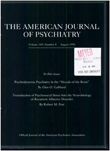Long-term predictors of outcome in abstinent alcoholic men
Abstract
Twenty-nine alcoholic men who had been abstinent for more than 2 years were evaluated behaviorally and neuroendocrinologically and then followed for 2 years. Mean length of abstinence at intake was shorter in the eight patients with histories of depression (3.3 years) than in the patients without such histories (6.8 years). Six patients relapsed during follow-up, all of whom had been sober less than 5 years. None of the neuroendocrine variables studied was predictive of outcome. In summary, abstinence of less than 5 years and comorbidity with depression were most predictive of poor outcome.
Access content
To read the fulltext, please use one of the options below to sign in or purchase access.- Personal login
- Institutional Login
- Sign in via OpenAthens
- Register for access
-
Please login/register if you wish to pair your device and check access availability.
Not a subscriber?
PsychiatryOnline subscription options offer access to the DSM-5 library, books, journals, CME, and patient resources. This all-in-one virtual library provides psychiatrists and mental health professionals with key resources for diagnosis, treatment, research, and professional development.
Need more help? PsychiatryOnline Customer Service may be reached by emailing [email protected] or by calling 800-368-5777 (in the U.S.) or 703-907-7322 (outside the U.S.).



